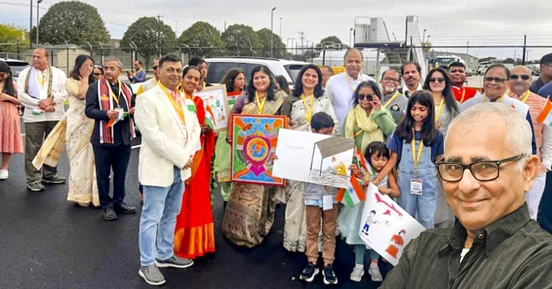By Inderjit Badhwar
With a population of over five million, Indian immigrants in the United States face an unprecedented climate of uncertainty as immigration policies hang in the balance, impacting both legal residents and those without status.
In recent years, Indian immigrants have become an integral part of the American social and economic fabric, numbering over five million. Representing one of the fastest-growing ethnic groups in the US, Indian-Americans include prominent figures across fields: from Kamala Harris, the US vice-president of Indian-Jamaican descent, to Usha Vance, wife of Republican Senator JD Vance, and public officials like Pramila Jayapal, the first Indian-American woman in Congress.
Tech giants, too, are led by individuals of Indian origin, with Sundar Pichai at Google and former PepsiCo CEO Indra Nooyi standing as prime examples. Vivek Ramaswamy, a former Trump insider, further illustrates the community’s complex role in American politics, as does the surprising lean of many Indian-Americans towards Trumpist policies.
Uncertain paths forward
Despite this remarkable success, Indian immigrants, both documented and undocumented, face an uncertain landscape shaped by fluctuating immigration policies and polarized political discourse.
Recent legislative proposals and executive orders have raised questions about H1B visas, family reunification policies, and pathways to permanent residency—all key concerns for Indians aspiring to build stable futures in the US. For undocumented Indian immigrants, often working in service sectors or as students facing visa expiration, the risks are even greater. Without the protection of legal status, they risk deportation and live under constant threat.
The community, in response, has turned increasingly to political activism and legal advocacy, striving to secure rights and expand opportunities.
The Trump factor
Interestingly, despite their significant contributions to technology, business, and culture, many Indian-Americans have embraced Donald Trump’s policies. Trump’s hardline stance on immigration has drawn complex responses within the community; while some fear its implications, others applaud his economic focus and perceived support for entrepreneurial ventures.
This Trumpist lean among Indian-Americans, while counterintuitive to outsiders, underscores a generational and ideological divide that shapes the community’s evolving identity.
The influence of prominent figures
High-profile individuals of Indian descent serve as symbols of possibility and challenge for the immigrant community. Vice-President Kamala Harris’ ascent to one of the highest offices in the land inspired a sense of pride and visibility for immigrants of Indian origin, particularly among women and young professionals.
Pramilla Jayapal’s advocacy for progressive policies provides an alternate voice that champions immigrant rights, a counterpoint to the conservatism observed in the political choices of many Indian-Americans. Corporate leaders like Sundar Pichai and Indra Nooyi represent the pinnacle of immigrant achievement, demonstrating how individuals of Indian heritage have navigated US systems to reach global influence. Yet, these figures also highlight a deep divide between high-skilled immigrants who attain legal status through professional success and the countless others who remain marginalized due to immigration constraints.
Looking ahead
As the US debates the future of immigration, the Indian-American community remains in a state of suspense. For legal immigrants, legislative shifts could mean increased restrictions or opportunities, depending on the administration’s stance.
For the undocumented, the challenge of securing status persists, with advocacy groups and legal experts fighting for reform. At this crossroads, the Indian-American community must navigate a delicate balance between assimilation and advocacy, Trumpist leanings and progressive alliances, as they seek a place in an America that remains, for them, both a land of opportunity and a source of uncertainty.


